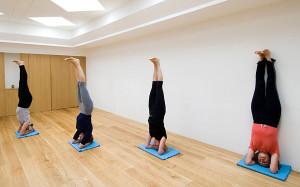If leaping around in a leotard or pounding the pavement seems like too much effort to stay healthy scientists may have found the answer.
Yoga is just as good as aerobics, cycling and walking for cutting the risk of heart disease.
Although perfecting the Plough or honing the Heron might not seem enough to improve heart health, scientists have found it can be just as effective as more strenuous exercise.
Not only does it boost suppleness, Yoga can cut stress and increase fitness levels.
“This finding is significant as individuals who cannot or prefer not to perform traditional aerobic exercise might still achieve similar benefits in cardiovascular risk reduction,” said Professor Myriam Hunink, of Erasmus University Medical Centre in Rotterdam.
“These results indicate that yoga is potentially very useful and in my view worth pursuing as a risk improvement practice.
“Yoga has the potential to be a cost-effective treatment and prevention strategy given its low cost and lack of expensive equipment or technology.”
The team reviewed 37 trials which included 2768 people which measured the benefits of yoga compared with exercise and no physical activity.
When compared to no exercise, yoga was found to reduce BMI (Body Mass Index), lower blood pressure and reduce cholesterol. On average, subjects were 2.75kg lighter than those who did no exercise.
And they found that for patients with existing heart disease the benefits were even greater when coupled with statins.
In comparison with exercise itself, yoga was also found to be as beneficial as aerobic exercise. The investigators believe that it might be because it reduces stress.
The researchers believe that yoga could be particularly useful for people with existing heart conditions who cannot do strenuous exercise, such as those with arthritis or the elderly.
Heart Disease is responsible for 82,000 deaths in the UK each year, an average of 224 people each day. Almost 1 in 5 men and 1 in 8 women die from heart disease.
There are currently nearly 2.7 million people living with heart disease in the UK, costing the NHS around £3.2 billion each year.
Maureen Talbot, Senior Cardiac Nurse at the British Heart Foundation, said: “Any physical activity that can help reduce the risk of cardiovascular disease developing should be encouraged, and the benefits of yoga on emotional health are well established.
“This study’s findings are promising, showing some improvement in blood pressure, cholesterol and weight, which are risk factors for cardiovascular disease.
“The benefits could be due to working the muscles and breathing, which can bring more oxygen into the body, leading to lower blood pressure.”
Increasingly yoga has been proven to be beneficial for a number of conditions and is now recommended by the NHS for pregnant women and cancer patients.
An earlier study found that regular sessions of the exercise can help fight off depression as it boosts levels of a chemical in the brain which is essential for a sound and relaxed mind.
Scientists from the Boston University School of Medicine found that the levels of the amino acid GABA are much higher in those that carry out yoga than those do the equivalent of a similarly strenuous exercise such as walking.
Last year the University of Illinois found that twenty minutes of yoga is better for boosting brain activity than vigorous exercise for the same amount of time.
Researchers discovered that a single, short session of the yoga significantly improves memory, speed and focus, more so than regular workouts.
And team from the University of York have found that specialist yoga classes could slash the number of days taken off work for back pain.
The new research was published in the European Journal of Preventative Cardiology.
From: The Telegraph

